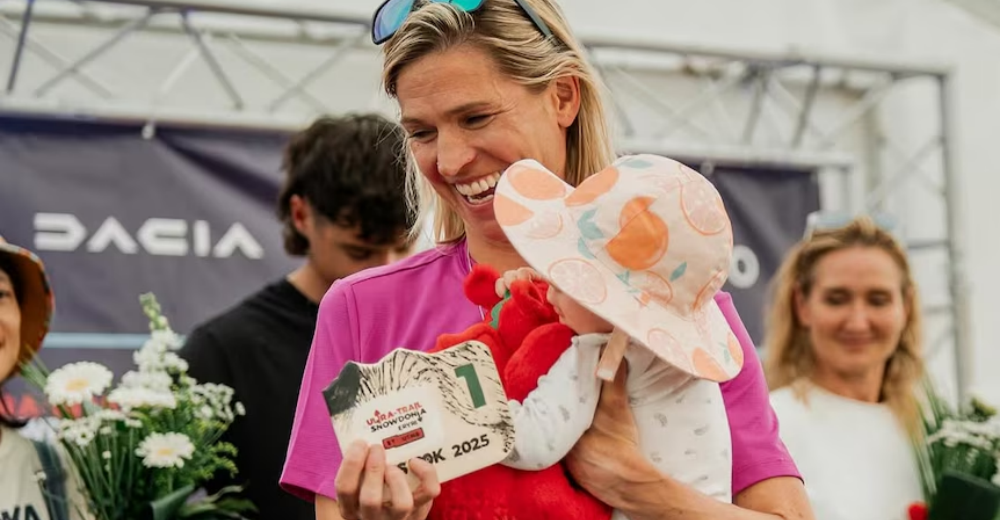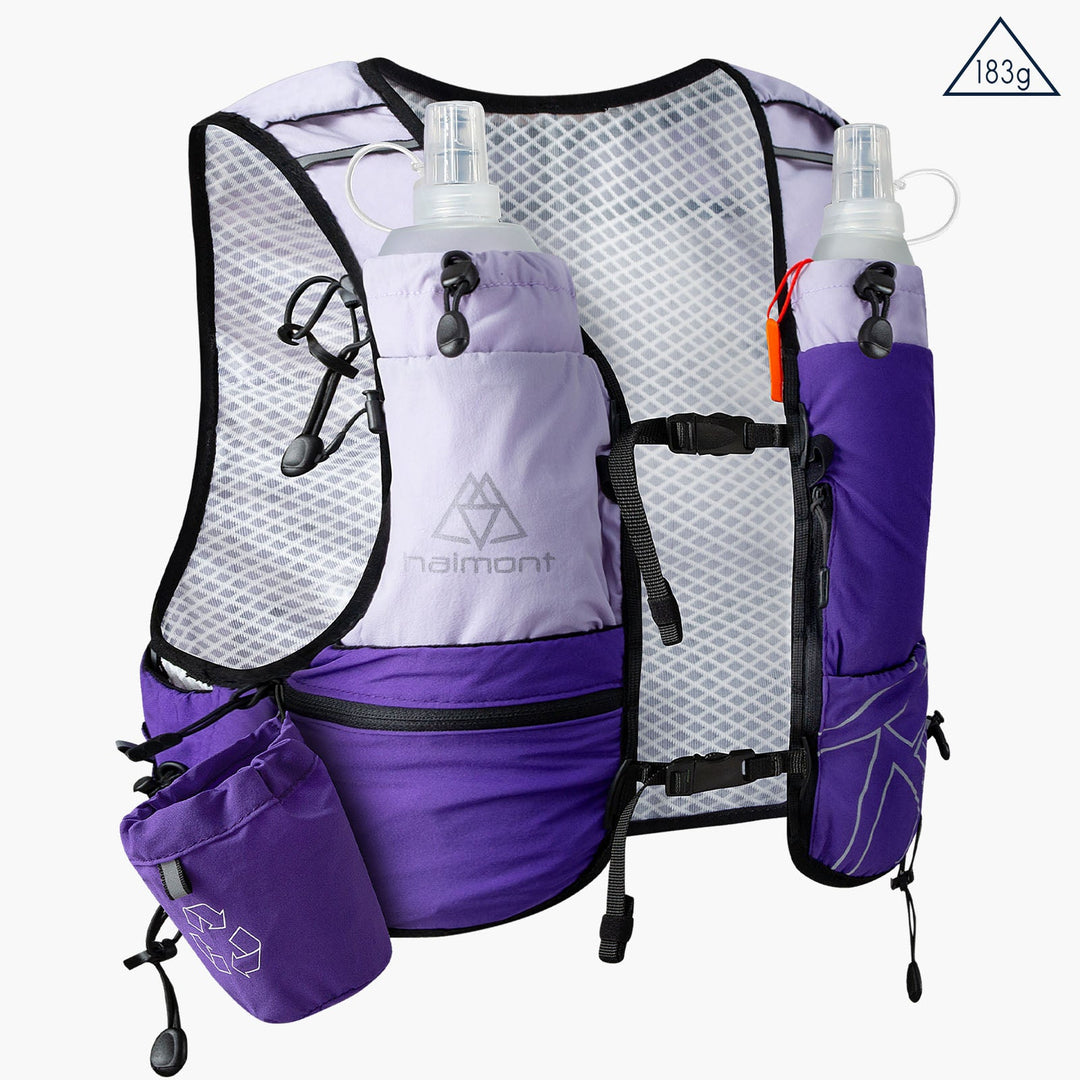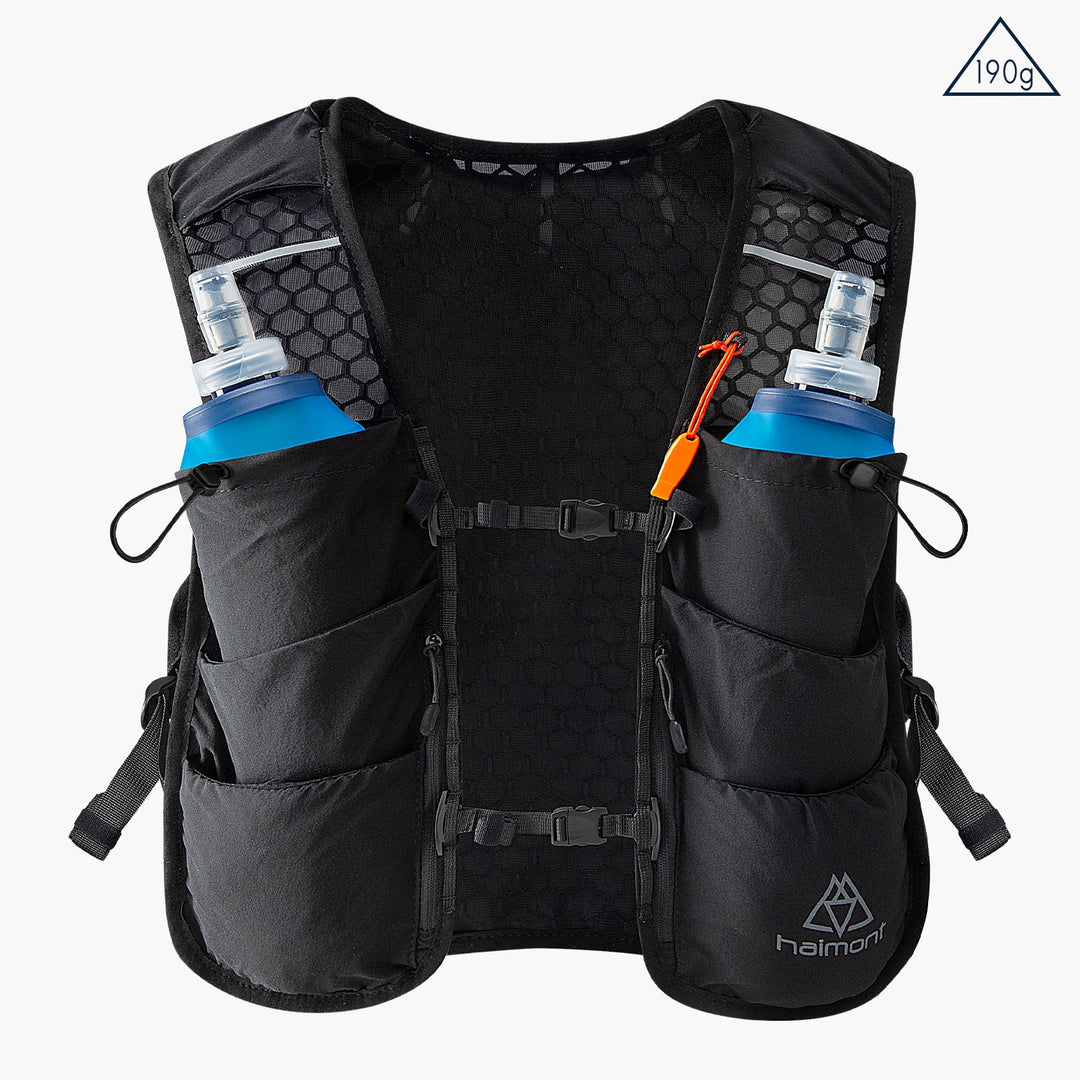In the minds of trail runners who have climbed mountains and crossed the wilderness countless times, running is a ritual of freedom and a way to communicate with the world and the heart. However, when a woman becomes a mother, this freedom seems to be suddenly "paused". From late-night feeding to day-to-day care, many new mothers suppress their former passion in exhaustion. They are not lacking in enthusiasm, but are just looking for a new way out - a way to find their own rhythm again between coaxing to sleep and the pace table, between the bottle and the energy gel.
Stephanie Case's postpartum return to the race is a microcosm of such a journey. She is not "returning to her past self", but **"becoming a new self"** - both a responsible mother and a fearless mountain runner. She used a 100-kilometer victory to tell all women: a change in identity does not mean the end of dreams. As long as you are willing, every stage of life can have your own high altitude.
 From peak to crib: Stephanie Case's identity transformation
From peak to crib: Stephanie Case's identity transformationIn the eyes of many trail runners, Stephanieis a legendary existence. She is the determined woman who fought the wind and snow for 330 kilometers in the Tor des Géants (Giant Tour), and the international humanitarian lawyer who has participated in the UTMB (Ultra-Trail Tour of Mont Blanc) many times and is active in Afghanistan and the Middle East. Her name represents the spirit of running for freedom without fear of danger.
But at the end of 2023, everything changed. Stephanie became a mother for the first time. Her life switched from snowy mountains and UN conference rooms to nighttime breastfeeding, diaper changes and crying babies. Physical fatigue, hormonal fluctuations, and the pressure of being a mother on call 24 hours a day pushed this strong person who once ran at an altitude of more than 3,000 meters to a new low in her life.
She wrote after giving birth: "I know I am lucky to have a healthy baby, but I still often feel lost - I am no longer the me who can run for 10 hours at any time."
This transformation is not just "cannot go back to the past", but more like a comprehensive reconstruction of the body and mind:
●Physical changes: Within a few weeks after giving birth, her core muscles almost lost tension and her pelvic floor loosened. The hike that could have been easily completed now needs to be done step by step with extreme caution.
●Psychological struggle: She admitted that the biggest struggle between motherhood and self is not physical, but "the fear of losing the familiar self". Every interruption of training and every incomprehensible training arrangement seemed to question whether she could continue to be a "trail runner".
●Identity conflict: From a global humanitarian law expert to a mother; from a competitive runner to a parent who accompanies her day and night - these identities are not contradictory, but often pull each other in the rhythm of life.
But Stephanie did not choose to give up. She began to try to integrate her life in a new way. She weaved her daughter's routine with her own recovery training - doing core training during the baby's nap, doing yoga stretching after successfully coaxing the baby to sleep, and even pushing a stroller to complete low-intensity running. She gradually understood that mothers and runners are not necessarily either-or, but two voices that can coexist in the same body.
"I never really 'left' running, it just quieted down temporarily. But my body remembers the feeling of running, and my heart never forgets the direction of the track."
From the peak to the crib, from the medals of the competition to the swaddling clothes, what she completed was not the abandonment of an identity, but the deeper acceptance and reconstruction of herself. Stephanie Case's story is a true portrayal of how a woman persists in her dreams in the midst of great changes, and it is also a microcosm of thousands of mothers struggling not to be defined in their daily lives.
The real challenges of postpartum runners: physical, psychological and social roles
Stephanie Case's postpartum comeback was not smooth sailing. Her success is not because she is a "natural strong person", but because she bravely faced and went through the real difficulties that every woman may experience. For many postpartum women, restarting sports - especially challenging trail running, is not just as simple as "physical recovery", but a comprehensive tug-of-war facing the triple challenges of physical, psychological and social challenges at the same time.
Physical Challenge: A Restoration Process of "Re-Understanding the Body"
Pregnancy and childbirth have a huge impact on women's bodies. Whether it is a natural birth or a caesarean section, the body's functions will temporarily leave the "optimal mode" of exercise.
● Loss of core strength: Rectus abdominis separation and weakened core muscles during pregnancy are the main problems for many women who cannot stabilize their bodies and restore their running posture after childbirth.
● Decreased pelvic floor function: Many postpartum women experience pelvic relaxation and urinary incontinence, especially when running up and downhill at high frequencies in trail running. These problems are more prominent.
● Breast changes and breast swelling and pain: Long-distance training during breastfeeding will cause discomfort due to breast congestion, and it is necessary to arrange breastfeeding time and exercise rhythm reasonably.
● Hormone fluctuations affect physical strength and recovery ability: In the months after childbirth, hormone levels are still in an unstable state, which may lead to increased fatigue, slow muscle recovery, and even affect emotional stability.
Stephanie did not "return" overnight. She only started to cooperate with physical therapists for core activation training in the sixth week after childbirth, using the lowest impact and most basic exercise method to rebuild her athletic ability from scratch.
"I see every postpartum jog as a way to get to know my body again," she said.
Psychological challenges: struggling between the identities of "self" and "mother"
After childbirth, many women will experience a huge psychological gap. Stephanie Case once publicly expressed in an interview: "I feel that I no longer belong to my own body. It belongs to the baby, to breastfeeding, to care, but not to myself." This feeling resonates in the hearts of many postpartum women.
● Shaking of self-identity: She is no longer the trail runner who can travel light and run for 12 hours without looking back, but a new mother who needs to calculate the "feeding window" and "baby sleep rhythm".
● Mood swings: Under the combined effects of hormone changes, physical pain and social isolation, she once fell into depression and anxiety, wondering "whether she can become a runner again".
● Perfectionism pressure: She admitted that she had a deep sense of self-blame for not being able to finish the original training plan, as if she could never have both the identities of mother and runner.
Trail running used to be a tool for her emotional healing, but now she needs to heal herself before she can embrace the track again. She gradually learned to accept "imperfect training" and regarded every short outing as a small reunion with herself.
Social role challenges: not only physical and psychological, but also misunderstandings from the outside world
In addition to internal challenges, social opinions and expectations of people around them often become "invisible stumbling blocks" for postpartum runners to return to training.
● "Mom should not run anymore" voice: Stephanie shared that she once heard someone comment "Now you are a mother, why do you run so far?" Such words reflect the society's single definition of "good mother".
● Uncertainty of spouse and family support: Not all women have the opportunity to get full support and assistance from their partners like Stephanie, which makes her pay special attention to the impact of family structure on postpartum training.
● Reallocation of time resources: The baby's time occupies most of the day, and running can often only be arranged in the early morning or at night. Training has become a "practice in the gap", which requires high self-discipline and flexible response.
Stephanie does not deify her own experience. She publicly shares all the difficulties just to tell other postpartum runners: These challenges are normal, and we are not facing them alone.

Self-repair in the mountains: The healing power of trail running
For many postpartum women, trail running is not just a way to exercise, it is a journey to find oneself again. For Stephanie Case, it is a process of "healing the body and mind in the mountains". Amid the pressure and physical challenges of becoming a mother, she stepped back onto the track, not for results, but to find the firm, brave and free self.
Reconnecting with the body: Every step is a repair and confirmation
Pregnancy and childbirth make many women feel that their bodies "no longer belong to themselves" - loose abdomen, joint pain, swollen breasts... Familiar movements become unfamiliar, and the journey that was once easily completed is now difficult. In the early days of postpartum training, Stephanie was also frustrated because she was out of breath after running two kilometers. But she gradually realized that trail running brings not only muscle recovery, but also a deep body awareness:
● Every breath is a proof of regaining rhythm;
● Every muscle stretch is a signal that the body is "returning home";
● Every slow slope jog is telling herself: I can still move forward.
The reason why trail running is healing is not because it is easy, but because it allows women to use their "feet" to confirm that "I am still here, I am still okay, and I can still do what I like."
Give emotions an outlet: settle anxiety and fatigue in the mountains and forests
The psychological pressure after childbirth is often beyond imagination: sleepless nights, constant anxiety, emotional breakdown, and identity imbalance. Stephanie mentioned in the interview that she had asked herself countless times when coaxing her children to sleep late at night: "Who am I? What else can I do?" It was a feeling of being trapped.
But after running into the mountains and forests, all of this had an outlet. No one urged, no one disturbed, only the whistling mountain wind and the echo of the soil. She said:
"In the mountains, no one called me "Mom", and no one waited for me to feed. I am just me - a runner, a woman."
Trail running became her "safe haven", allowing her to release emotions and clear her mind while running, and gradually transform anxiety into strength.
Research has also confirmed that medium-to-high-intensity exercise in a natural environment (such as trail running) can significantly reduce the risk of postpartum depression and improve psychological resilience. This is physiological hormone regulation, but also active mental repair.
 Rebuilding confidence: Prove "I can still do it" on the track
Rebuilding confidence: Prove "I can still do it" on the trackStephanie Case did not do it to prove to others, but to herself: a change in identity does not mean the end of passion. After completing the Ultra-Trail Snowdonia 100km race, the most touching sentence she said was:
"I'm not trying to prove that I can still win the race, I just want to tell myself that I haven't lost the me who is willing to grit my teeth and stick to the end."
Returning to the track after giving birth is a declaration of **"I still deserve to have a dream"**. Every climb and every crossing of the finish line is telling the world that mothers are not sacrifices, they can still be challengers and climbers.
More importantly, such confidence will also be passed on to her children. Stephanie hopes that when her daughter grows up, she can see a mother who is not only dedicated to the family, but also a female role model who is always loyal to her passion.
Trail inspiration for every postpartum mother
Not every mother needs to be a world-class trail runner, but every mother deserves to have a mountain trail of her own. Stephanie Case's story is not about how many races she has completed, but about her first step - that step means that even if her role changes, her body changes, and her rhythm is disrupted, she still chooses to run for herself, for her passion, and for freedom.
Her experience conveys a firm message to all postpartum women:
Your body deserves patient repair, your dream deserves to be pursued, and your persistence deserves to be seen.
● It's okay to go slower: every step counts
Postpartum recovery has never been a race to "pursue speed", but a process of "trusting the body". You can start with a five-minute walk every day, a short uphill jog while your baby is taking a nap, or the idea of being out of breath after running two kilometers but still willing to persist.
Stephanie wrote on the social platform:
"It took me several months to recover from being able to walk to being able to run easily, but every progress makes me believe more: taking it slow can also be good."
Even if you can't run ten kilometers in one breath, as long as you take the first step, you are a runner.
●Take back your own time and space: You are not just a "mother"
Motherhood is an extension of love, but not the end of identity. Running is not just about exercising, but also a way of "self-claiming". In the mountains, in the morning light, and on the road where you run and listen to the birds singing at dusk, you can temporarily put down the roles of feeding, preparing meals, and coaxing to sleep, and return to yourself.
Trail running is not an escape from life, but a return to life with a more complete self.
Stephanie often said that her motivation for running is not to stay away from her children, but to become a more energetic and confident mother.
●Listen to the body and respect emotions
Postpartum running does not require "fighting", but "awareness". Rest when you are tired, change to a more supportive sports bra when your chest is uncomfortable, and walk to complete training when you are depressed - these are not "giving up", but mature and wise choices.
Stephanie often said:
"You are not returning to the past state, but becoming a brand new self."
Running is not just about the feet, but also a journey of the heart. Every tear, every hesitation, and every decision to postpone training are your efforts to explore your own rhythm.
● Refuse to compare, find your own rhythm
Those inspirational stories on the Internet such as "running a full marathon six weeks after giving birth" and "setting a PB with a baby" are inspiring, but they are not the standard for measuring your value. Everyone has a different starting point, different physical condition, different resources and support systems. What really matters is whether you are loyal to your own rhythm and respect your own reality.
When Stephanie finished UTMB, her daughter was already cheering for her. And you, who have completed today's 5km training, are also worthy of pride.
● You are not alone, the world is paving the way for you
You are not the only mother who puts on running shoes after the baby falls asleep, and you are not the only mother who participates in competitions with breast pads and breastfeeds on the mountainside. The world is becoming more inclusive and diverse because of women like Stephanie.
In the story of Stephanie Case, we see how a mother re-carves out a space for herself that belongs to the mountains and freedom in the chaos and exhaustion. She is not a superman, nor an exception, but a microcosm of countless postpartum women. She told us: It doesn't matter if you run slowly or walk fast, as long as you don't give up your heart to go to the mountain.
Haimont always believes that trail running is not a competition with others, but a reconciliation with yourself. Every mother deserves to be treated gently by the world and firmly accepted by the track. We are willing to accompany you with light equipment and thoughtful design to find your own rhythm between parenting and love.
The finish line is not far away, it is hidden every time you tie your shoelaces and set off in the morning light. The mountain is still there, and you are still there. Keep running - for yourself.









